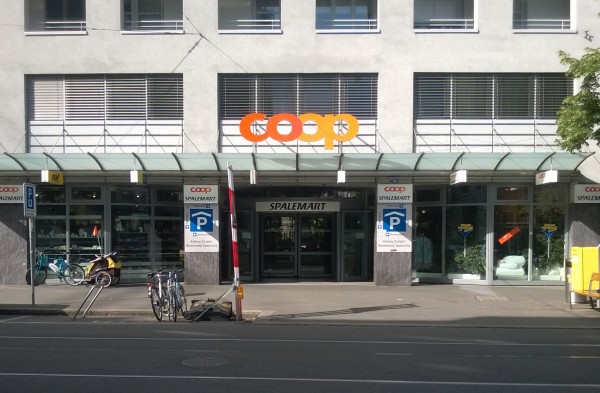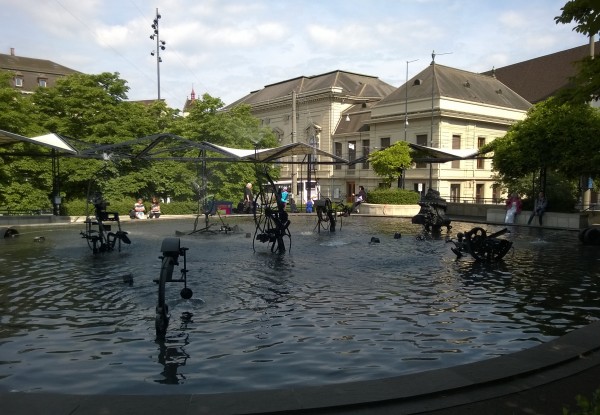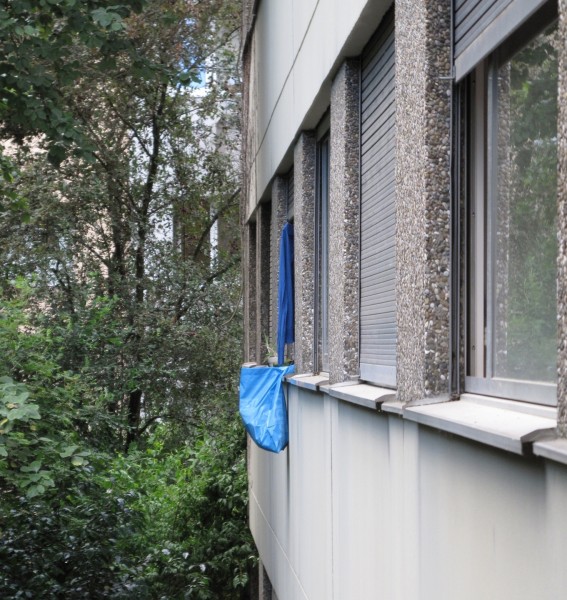Basel has population of approximately 173,000 people, which is nice, because it’s almost the same as Pilsen with population about 170,000 people. Similar is also geographic location and elevation above sea-level. So, I can compare these two cities quite objectively.
Basel Stadt
Area of Basel is much smaller than Pilsen – 23.91 km2 × 261.47 km2. But here are almost no high panel buildings with many flats – people usually live in lower buildings. High population doesn’t take free places; there are a lot of parks and green places – in and around the city center and elsewhere too.
Basel and surrounding cities grew together to one huge agglomeration, sometimes you even don’t recognize, you are in different city and due to great public transport, and you can get from different city to Basel very quickly.
Shopping
Here are two main shopping chains – Coop and Migros. Each of them has in Basel several shops with different sales capacity. Coop is located about 30 seconds’ long walk from my apartment. Migros is a bit further in about 4 minutes walking distance. Originally, I thought I will shop in Coop on the daily basis and sometimes go to German’s Aldi for some bigger purchase.
I changed this intention after my first visit. Offer of this particular one Coop store is big, so as prices. For example: bunch of radish for 1.90 CHF, 100 g of cheese from 5 CHF, some 60 g roll for 0.70 CHF. Migros seems to be a bit cheaper, but still very expensive. We usually go to Coop/Migros to buy some lunch with other colleagues from work – there are prepared meals as cooled or even warn, or they then warm it for you free of charge.
I go shopping to Aldi usually twice a week; I have good connections using public transport there from work and even from home. Food is Aldi is for similar price as in the Czech Republic, but has better quality.
Public Transport
Here are 2 concurrent companies that are providing local and regional public transport – BVB (Basler Verkehrs-Betriebe) and BLT (Baselland Transport) and they are integrated to TNW (Tarifverbund Northwestern Switzerland). It looks complicated, but as customer, I don’t care which company operates which line. Subscription for 73 CHF per month allows you to travel unlimitedly in whole TNW area, considering dimensions of this area, price is quite cheap.
All trams and busses are clean and trams are usually very long. Many of trams and busses have air conditioning and some even free Wi-Fi connection to the Internet. Not air conditioned trams has tilting windows and there is not as terrible draft as is in Pilsen’s trams. A lot of tram stops are in curves or on street crossings.
Public transport is also crossing borders to Germany and France, but there is not valid standard subscription and you have to buy ticket or debus. Basel is one of the two places in the world, where you can cross state border in a tram.
EuroAirport Basel-Mulhouse-Freiburg is situated in France and it is the only airport in the world, which operates for 3 different countries and also has 3 different IATA codes (BSL, MLH and EAP). It lies 6 km from Basel and is easily accessible by public transport from Basel.
Cars and drivers
I don’t commute on daily basis by a car, but I drove through the city several times. There are several through highways and one of them has 10 lines (both directions). Basel is undermined with lots of tunnels and underground parking lots for cars and surprisingly even for bicycles. At the first sight on the map, there are many complicated street crossings, but they are well marked with proper traffic signs and I never turned wrong. I admit, I had GPS navigation, but I was alone in the car in completely new city, so I’m considering this slightly as an achievement.
Local drivers are really nice and always let people cross the street on pedestrian crossings and often even off the crossings. Sometimes are driving faster than I’d expect in the city center, but they always hit the brake and let you cross the street. Drivers mostly don’t drive in the middle of street crossing, if they see, they would not leave it immediately and they’re waiting in front of that particular crossing. Drivers are driving more peacefully with more respect to each other including drivers of public transport.
It looks like here are more cars than in Pilsen, but traffic jams are weaker.
Cars are generally quite new and more luxury. Probably the most common cars are Audi and BMW. You can see Porsche several times a day, sometimes even vintage one. Other luxury manufactures like Jaguar, Ferrari, Ford Mustang, etc. are quite common. Quite a lot of cars are convertible.
Cyclists
Many people are riding bikes here. City is adjusted for this kind of transport with many of cycle ways. Some places are overfull by parking bikes. All sorts of people are riding bikes – young and old, wearing sport clothing or quite formal clothing like shirt and trousers or some women dress with a skirt including high heels.
Cyclists are well-disciplined, they are following traffic regulations, don’t ride on red light and even letting people cross the street on pedestrian crossings!
People
For local people I have just one observation – they smoke too much, on the street, in the park, on tam/bus stops… simply everywhere. I’m nonsmoker and don’t appreciate this too much. They smoke usually cigarettes, sometimes even tobacco-pipe. Workplace, shops, public transport are of course nonsmoking.
Nice custom is to have lunch in parks; they are not in so much hurry. In Czech, I used to be the last one, who finished up his meal, but my speed of eating is average here.
People seem to be respectful to each other no matter their age or how do they look like. Even with little things, for example: doors of public transport are closed independently automatically after some time being open and there was father with his small child getting slowly of the tram and some non-related old lady just held the button for opening the doors to avoid unexpected closing. And there are much more situations like this. Strange people even say hallo if you just smile on them.
Another example could be how people behave to other people stuff. I found several brand new windows’ plastic frames with glass just standing next to building on the side of the quite main street. I found it on Sunday, I guess it was there at least from Friday and workers were installing them on Monday and frames and glass survived – nobody broke or damaged them.
Waste Disposal
It probably depends a bit on building where you live, but my building separate waste to 6 different containers: paper & carton, PET, aluminum, cans & tins, glass and normal domestic waste. For the first 5 sorts, there are containers in the building and are free of charge, or if you like included in the rent. Normal domestic waste must be put in special blue Bebbi-Sack and you have to buy them individually. Bebbi-Sacks are sold in variety of capacity on many places. One role of 10 the smallest ones per 17 liters costs 12 CHF, price includes pick-up, transport and disposal.





